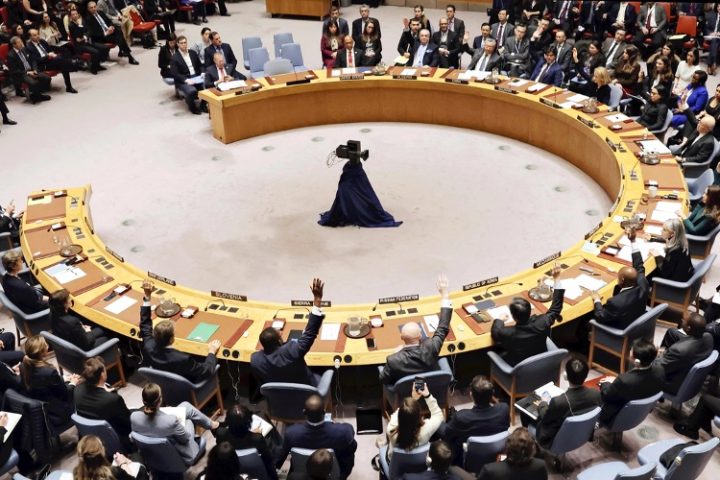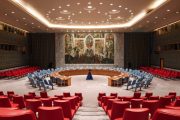
On April 18, the United States blocked a UN Security Council (UNSC) resolution that would have acknowledged a Palestinian state, according to various media reports, including CNN and Qatar-based Al Jazeera.
Twelve members of the Security Council voted to support the resolution, while the U.K. and Switzerland abstained. Only the United States vetoed it.
Before the vote, Algeria’s envoy to the UN Amar Bendjama proclaimed that the time had come for Palestine to take its place among UN member states.
“Today, the call of history resounds once again. And it is my honor to put before the council the recommendation to admit the State of Palestine as a full member of the United Nations.”
“It is a critical step towards rectifying a longstanding injustice,” Bendjama added, calling on every member to back the resolution.
Likewise, before the vote took place, Ziad Abu Amr, the UN special representative for the state of Palestine, urged for support from the UNSC.
“We are still longing to practice our right to self-determination, to live in freedom, security and peace in an independent state similar to other countries around the world,” Abu Amr stated.
Palestinians, he added, “made and continue to make great sacrifices to achieve this goal.”
U.S. State Department deputy spokesperson Vedant Patel had announced previously on April 18 that his country would veto the UNSC resolution, per reports by Axios.
“The most expeditious path towards statehood for the Palestinian people is through direct negotiations between Israel and the Palestinian Authority with the support of the United States and other partners who share this goal,” Patel elaborated, as quoted by CNN.
After the veto, the U.S. deputy envoy to the UN, Robert Wood, said Washington contends that only direct talks between Israelis and Palestinians would pave the way toward Palestinian statehood.
Wood assured the Security Council that the veto “does not reflect opposition to Palestinian statehood but instead is an acknowledgment that it will only come from direct negotiations between the parties.”
“We also have long been clear that premature actions here in New York, even with the best intentions, will not achieve statehood for the Palestinian people,” Wood added.
The U.S. decision to exercise its veto was hardly surprising, given that Washington has been Israel’s staunchest ally for years.
Mahmoud Abbas, the Palestinian Authority (PA) president, harshly slammed the U.S. veto, saying in a statement that it was “unfair, immoral, and unjustified, and defies the will of the international community, which strongly supports the State of Palestine obtaining full membership in the United Nations,” according to CNN reports.
After the vote, Palestinian UN Ambassador Riyad Mansour told the council, “The fact that this resolution did not pass will not break our will and it will not defeat our determination.”
“We will not stop in our effort,” he continued. “The state of Palestine is inevitable. It is real. Perhaps they see it as far away, but we see it as near.”
Mansour reiterated Palestine’s aspirations for a two-state solution but reinforced that Israel regards Palestine as “a permanent strategic threat.”
“Israel will do its best to block the sovereignty of a Palestinian state and to make sure that the Palestinian people are exiled away from their homeland or remain under its occupation forever,” he said.
“What will the international community do? What will you do?”
According to Al Jazeera senior political analyst Marwan Bishara, the U.S. veto on April 18 showed that Washington has a “my way or the highway” attitude toward Palestinians.
“Palestine could only be a country the way the United States sees it, or Israel sees it, only at the time that it’s suitable to the United States and within the geopolitics and the global interest of the United States,” Bishara asserted.
The United States, Bishara added, is forfeiting the “freedom of Palestinian people for egotistical and narrow interests of the United States and Israel.”
After the vote, Gilad Erdan, Israel’s UN ambassador, voiced his gratitude to the United States, especially President Joe Biden “for standing up to the hypocrisy and politics in the Security Council”.
Furthermore, Erdan condemned UN members’ support for Palestinian statehood in a post on X:
Erdan then proceeded to decry the PA as “a terror supporting entity,” questioning the group’s eligibility in meeting UN membership requirements of being a “peace-loving” state.
“How can you seriously say that the Palestinians are peace loving? How?” Erdan asked. “The Palestinians are paying terrorists, paying them to slaughter us. None of their leaders condemns terrorism, nor the October 7 massacre. They call Hamas their brothers.”
Yet, Erdan argued, most UNSC members supported Palestinian membership in the UN.
“It’s very sad because your vote will only embolden Palestinian rejectionism and make peace almost impossible,” he fulminated, lashing out at the PA as a “genocide-loving entity that doesn’t deserve any status” in the UN.
Erdan further posited that the PA lacks authority over Gaza and some parts of the West Bank. “So who is the UN going to recognise? Who is going to be in charge?” he asked.
“The UN is not committed to multilateralism. Sadly, it is now committed to multi-terrorism,” he continued. “Today the mask has finally fallen. The UNSC has exposed itself.”
While Erdan’s narrative contains some truths about Palestinians engaging in terrorist attacks against Israel, some say his version of events portraying Israel as a Middle East underdog has glaring omissions.
For instance, the link between Israel and terrorist group Hamas has been proven to be more than a mere “conspiracy theory” in mainstream news reporting, published books, and even statements by Israeli politicians indicating that current Israeli Prime Minister Benjamin Netanyahu’s “strategy is to keep Hamas alive and kicking … even at the price of abandoning the citizens [of the south] … in order to weaken the Palestinian Authority in Ramallah.”
Similarly, the Haaretz news outlet conceded that Netanyahu was complicit in supporting Hamas:
“Anyone who wants to thwart the establishment of a Palestinian state has to support bolstering Hamas and transferring money to Hamas,” he told a meeting of his Likud party’s Knesset members in March 2019. “This is part of our strategy — to isolate the Palestinians in Gaza from the Palestinians in the West Bank.”



